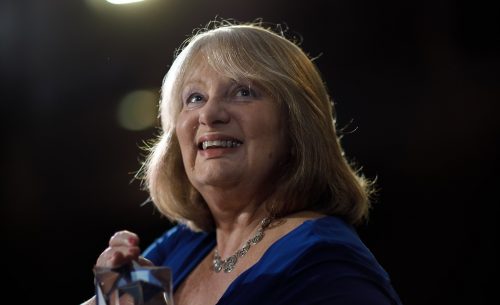Exclusive: Joy Kingsley to retire from JMW

Joy Kingsley is to retire as the senior partner of law firm JMW after 12 and a half years in which the firm has grown into a major player in the Manchester and national legal market.
Speaking exclusively to TheBusinessDesk.com, she insists it will be “a proper retirement”, but will be offering advice to the new three-man leadership team at the Spinningfields headquartered firm for three days a month.
“I’m 67 and I have a house in Majorca where I intend to spend a lot of time and enjoy life,” she laughed.
When she took over in 2010 the firm employed 170 people, and now has a headcount of 725, an office in London, and has grown as a business to be one of Manchester’s top full service law firms, through high-level recruitment and innovative business models.
“I’d done it once already at Pannone, that’s why the partners asked me to come in and transition JMW from a clinical negligence and personal injury practice to be a full service law firm,” she said.
The firm will now be managed by Marc Yaffe as managing partner, Chris Sutton as chief executive and Warren Martin as senior partner.
Kingsley has been in law firm management for 26 years having grown Manchester stalwart Pannone from fee income of £5m to £50m, then grew JMW from £10m to £75m, from the point where she took over from founder Bill Jones in 2010. The initials JMW originally stood for Jones Maidment Wilson.
The bigger the firm, the more management was needed when Bill retired, she said, reflecting that JMW is now the largest Manchester headquartered law firm.
As a practitioner before moving into law firm management she’d advised clients over a wide range of cases from corporate to residential property, which she said helped her understand everyone’s issues and “no-one could pull the wool over my eyes either,” she said.
JMW was also already handily based in Spinningfields from a time when the area was “a bit of a dark and dismal wasteland” between Granada TV and Deansgate, which made the firm something of an early adopter of change and ambition in the city.
“Mike Ingall of Allied London has done a fantastic job transforming it into a great and vibrant area,” Kingsley said.
But she also added that the change she oversaw at JMW was emblematic of a growing self confidence amongst Manchester’s financial and professional community.
“At one time big Manchester businesses would use London firms, but what’s changed is that London firms are now operating in Manchester.”
Other major changes have been the greater emphasis on business development, after the Law Society changed the rules on touting for business and advertising their services to clients.
But she is also conscious that she is still a rarity as a powerful female leader in a male dominated profession.
“The main reason I chose JMW was because I believed I could take it on a similar journey. Yes, it’s still a male dominated profession and there still aren’t many women in senior leadership positions in the law.”
In those 26 years of leadership she’s managed to grow both firms through periods of incredible change, and considers a need for speed and quality by clients to have been the most important factors to master.
“Relationships are always important, but the whole ‘I want it now’ generation has found its way into professional services, at a time when it’s still very important to keep standards up.
“People want everything immediately and that has raised expectations. A large piece of litigation advice won’t be done overnight, but sometimes immediate strategic advice is needed and it has to be right and on point.”
She also reflects that there is a lot more movement between firms now and that ambitious lawyers will zig zag between firms to get experience and progress their careers. But she said her time at JMW hasn’t been too challenged by partners leaving, and has only lost 6 out of 60 equity partners in her time at the firm.
During her reign at JMW there has been huge turbulence across the city’s legal community. “The most profitable firm in the city, Halliwells, and Cobbetts, who everyone looked up to, both disappeared.”
She said she had been criticised for not expanding Pannone into Birmingham and Leeds as Cobbetts did – but insisted her decisions were always based on managing income, keeping profits reasonably high and ensuring both firms were always enjoyable places for people to work, which then made it easier to recruit people with the same ethos.
She paused when asked which firm she is most proud of running and diplomatically said “both”, but added that pride isn’t what motivates her.
“I never think something could fail, you have to create something people will stay for. I had the trust of all the partners to do that.”
She said the support from all of the people at JMW has been “second to none” especially as they gave her the freedom to come up with ideas to grow the business and supported her in implementing them.
Under her watch the firm has utilised technology particularly effectively, including Lawshare which the firm launched in 2011 enabling firms to refer work to one another when they may be unable to act for a particular client.
“Bill Jones took a chance on me, but I’m quite strong willed. I think I needed to be, because no-one but Bill had ever run the firm before.”
The challenge for Yaffe, Sutton and Martin is they now have two giants to stand on the shoulders of.







